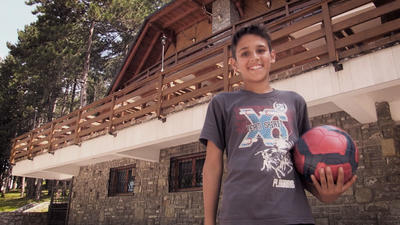During the last week, the number of migrants and refugees stranded in the forests around the village of Idomeni on the border between Greece and the Former Yugoslav Republic of Macedonia (FYROM) has increased tenfold.
Médecins Sans Frontières/Doctors Without Borders (MSF) has been offering medical consultations, psychological support and relief items since April, and is now planning to reinforce its activities in the area by launching an additional mobile team.
Due to a recent enhancement of border enforcement by the FYROM police and special forces, more than 2,000 people travelling towards northern Europe have found themselves blocked at Idomeni, and some are now attempting to cross at other border points.
Fleeing war and violence
Most of the people seen by MSF’s medical team are fleeing war and violence in Syria, Afghanistan and Iraq, with some particularly vulnerable - elderly or disabled people, pregnant women, and children under five years old. Many are living in squalid conditions, staying outside in the bush or at the train station, without any shelter, food or access to hygiene facilities.
“The situation will become much worse if more people get stranded in the area, because there are no basic facilities here and people are scared of what will happen to them," says Antonis Rigas, MSF project coordinator in Idomeni.
"Many are forced to take great risks in order to avoid being found, and sadly there have been several accidents across the border where people have died.
“It’s absurd how people who are fleeing war and violence are forced to risk their lives in order to finally reach safety in countries that are able to ensure their protection.”
Sarah's story

“Our father was killed in Uganda by a neighbouring tribe, in a land dispute. Some people helped us to get to Kenya because they knew our father and were thinking that the tribe were going to kill us too.
Someone then directed us to go to Turkey and then to Greece.
In Turkey we boarded a small inflatable boat with 45 people. After travelling a small distance, people realised that water was slowly entering the boat.
We tried to call the coastguard but they were not coming. The water had already started to come inside the boat and we were all getting wet, even the babies. We thought life was over for us.
No one knew what to do. Then we said our prayers and everyone was crying because the boat was sinking. One person had a heart attack. But suddenly we saw a big torch and we were rescued by the Greek people.
It was like I saw God himself.
After, they took us to the hospital. They also gave me some medicine and my sister’s baby some new clothes. They even gave us food.
We then took the big boat to Athens, and then a train to Thessaloniki.
From there it’s not easy to get transport to here, so we walked all the way.
At the border, the police came and found us and arrested my sister and my friend. They let me go because I was pregnant. After a while, they released my sister and my friend.
We are travelling with some Syrians. They are very nice to us, some speak English so we can understand. They give us water and help us with the baby.
We are very much afraid to cross the border into Macedonia because we hear they rape women there. But we can’t go back to Africa now.”
Medical support
MSF’s mobile medical teams have been visiting the area five days a week, offering medical consultations, psychological support and distribution of relief items such as blankets, energy bars and soap. Over the last week, MSF has provided consultations to an average of 85 people each day.
The majority of the medical problems are respiratory tract infections, skin infections, muscle pains and gastro-intestinal diseases that can be linked to the living conditions during their journeys.
Many patients suffer from serious blisters and muscle pain from having to walk for more than 70 kilometers from the city of Thessaloniki, as they are refused access to public and private transportation to the border areas.

Heavy-handed border officers
“Many of the people have suffered traumatic events in their home countries and have had to endure an exhausting and dangerous journey,” says MSF psychologist Aggela Boletsi.
“In addition to this, people are now being pushed and shouted at by border officers, policemen are firing gun shots in the air to keep the people out, and we’ve even treated bruised patients who say they’ve been beaten by the border officers. Naturally, many people get scared when confronted with such a heavy-handed approach.”
To respond to the increased number of people in need of medical care and support, MSF will scale up its activities by launching a second mobile team in July, which will enable a continuous, seven-day-a week presence in the Idomeni area.





